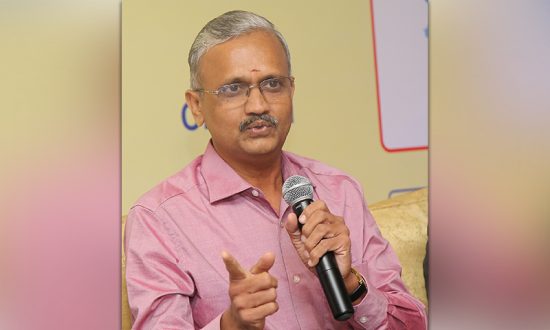Anbu Nedunchezhian is a mechanical engineer by qualification and trained by ISB on management. Having vast experience of 32 years in manufacturing industry.He served in alloy steel foundry,auto component industry and serving as General Manager operations for a leading construction and mining equipment manufacturer in India. Anbu is a member of CII TN State Council and a chairman of CII TN State Smart Manufacturing Forum.He is also a member of national executive committee in NIQR (National Institute of Quality and Reliability).
In 2020 Jan, when we started hearing about a virus spreading across the globe, we, all members of manufacturing industry were in an opinion “It will impact IT industry significantly, but not us”. Unfortunately within a quarter, we started seeing an impact across the value chain. In fact, some of the Indian manufacturing companies lost their senior executives for Covid.
It became the biggest disruption of the century. Entire world started to manage the crisis by continuous learning. This article is to focus on what was learned by Indian manufacturing industry, how it sailed over all tides and waves, how it repositioned itself for growth.
In a survey conducted by CII, 80% of manufacturing member companies said they increased their health and safety spend more than 20%.It led to a paradigm shift in our thinking. Health and safety was always considered as compliance element in most of the Indian manufacturing industry. But now it has become a commitment to take care of all employees. Lots of changes were made in welfare schemes, wellness programs and insurance etc. Now we have more robust health care in place in most of the factories.
We never thought people can work from home for a manufacturing company. It was unimaginable to run the factories with 50% of workforce. Corporate offices which used to operate in luxurious buildings started reevaluating the need for such luxuries. Lean thinking emerged and paved the way for more competitive cost structure in operations.
From what I have observed, a job in manufacturing is least preferred by millennials due to strict timings without flexibility. This pandemic taught us how to create flexibility in employee engagement and attract more talents for manufacturing.
In the first wave, the biggest disruption was migrant labour availability. It exposed our dependency on such labour and weakness of not having skilled resources locally, All factories started running without that dependency and learned to manage. Reforms started in skill development. Capability building became more agile.
Discipline in wearing mask (PPE),sanitizer usage and social distancing, all created cultural shift in our factories which saved lot of lives. It also allowed us to run all essential goods manufacturing factories on non-stop basis even in peak pandemic situation. It has accelerated our recovery after the first wave with intensive vaccination programs supported by government. This enabled most of the manufacturing companies to come back to 50% level of capacity utilization very quickly.
While we were adapting for changes, the second wave posed a new challenge -Oxygen shortage. That is, non availability of gas for cutting metals. Manufacturing industry relentlessly worked and innovated alternate methods such as Water jet cutting, Plasma cutting, Laser cutting etc.Some of the small operations completely eliminated oxygen dependency and declared as “Oxygen Free Operations”. Process innovation became a habit.
With geographical and demographical advantage, India will continue to attract global manufacturers since we have more rigid value chain. Industry forums along with government, started exploring the manufacturing of products which are currently getting imported in big volume. Once this comes in practice, we can avoid certain crisis like semi conductor shortage.
This pandemic enhanced collaboration between industry and the government. Irrespective of political situations, all states across the country collaborated with industry for oxygen supply, ventilator manufacturing, mask / sanitizer manufacturing and vaccination drives etc.
Consulting with industry became the way of administration. Lot of flexibility in governance process evolved to mitigate the risk anticipated.
During this pandemic, every organization understood the need for connectivity and technology. Sustainable smart solutions were evolved with competitive cost. Now technology is available at affordable cost. Our factory shop floors are becoming smarter with Industry4.0 implementation and capable of attracting smarter talents.
In a CII survey,66% of manufacturing member companies said they had an excellent emergency response plan for second wave. Today it could be more than 80%.It shows how agile we are in r responding to the emergency situation.
According to Japanese Quality Guru Taguchi, when we consider noise factors while designing a product or process, that product or process will become more robust while performing. Every manufacturing company in India, started adding this noise factor “Pandemic” in their own strategy plan to mitigate the risk and become more robust.
Today demand is increasing, supply constraints are getting addressed. Enhancing capabilities, exploring opportunities and expanding the business has become a way of growth, exclusively for Micro,Small and Medium Enterprises. Indian supply chain is getting graduated as global value chain. Weakest links of our value chain is getting addressed through reforms at country level. Indian manufacturing industry got a great growth opportunity after pandemic, industry learned to become robust, It will perform better and better…It will become a great place to work.


